Legal Rules and Ethics in Business: CSR, Ethical and Legal Aspects
VerifiedAdded on 2022/09/27
|6
|1257
|18
Essay
AI Summary
This essay delves into the complex relationship between legal rules and ethical responsibilities in the business environment. It highlights that while legal rules ensure proper conduct and are enforceable, they do not always encompass all ethical obligations. The essay explores scenarios where actions may be legally permissible but ethically wrong, such as a company selling products with terms that absolve it of responsibility for damages caused by natural disasters, despite the products failing shortly after purchase. Conversely, it examines situations where actions might be legally wrong but morally right, like a business person repairing damaged items for free despite the terms and conditions. The essay concludes that consistent adherence to legal rules may sometimes harm customer-business relationships, and ethical behavior can enhance customer loyalty and employee satisfaction.
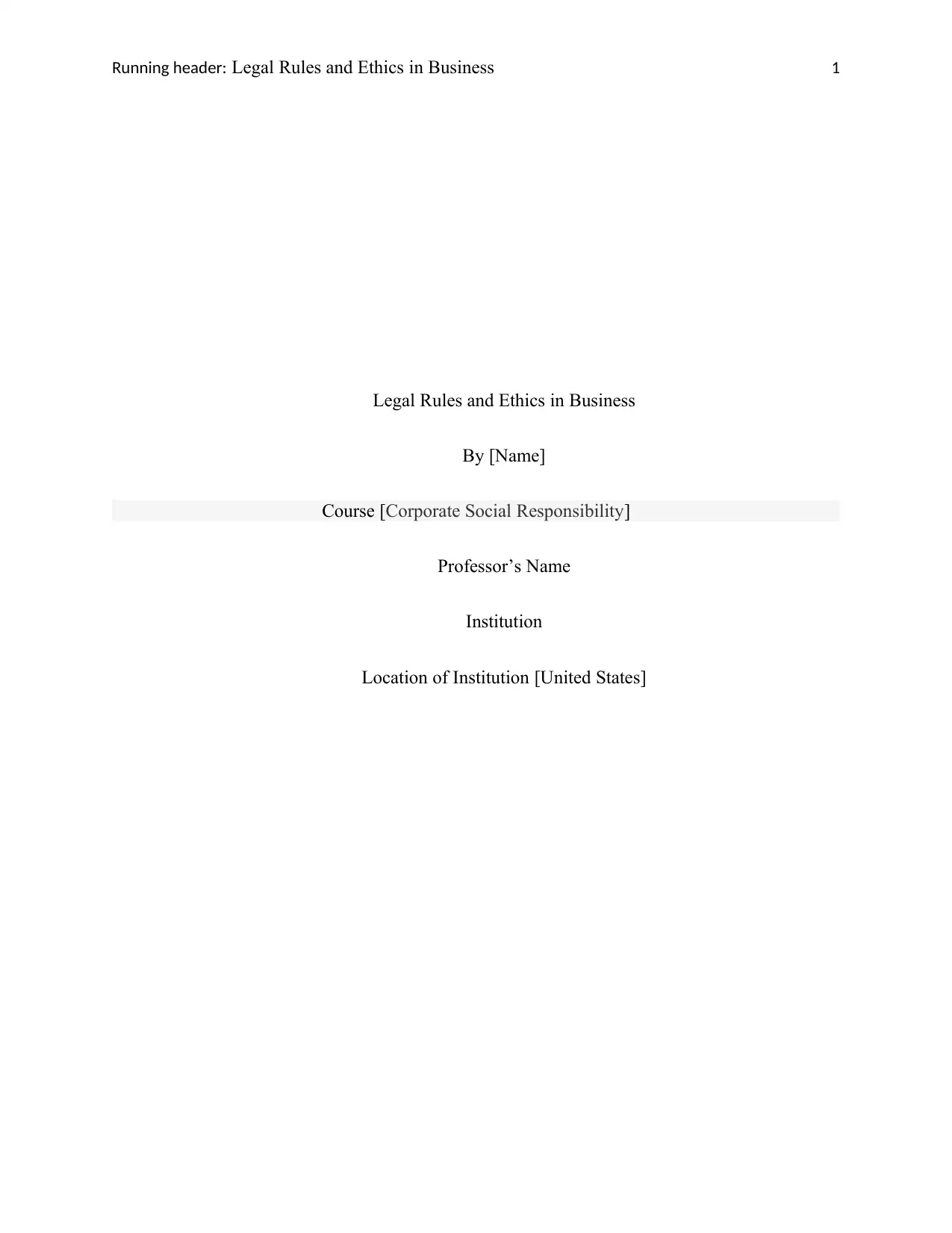
Running header: Legal Rules and Ethics in Business 1
Legal Rules and Ethics in Business
By [Name]
Course [Corporate Social Responsibility]
Professor’s Name
Institution
Location of Institution [United States]
Legal Rules and Ethics in Business
By [Name]
Course [Corporate Social Responsibility]
Professor’s Name
Institution
Location of Institution [United States]
Paraphrase This Document
Need a fresh take? Get an instant paraphrase of this document with our AI Paraphraser
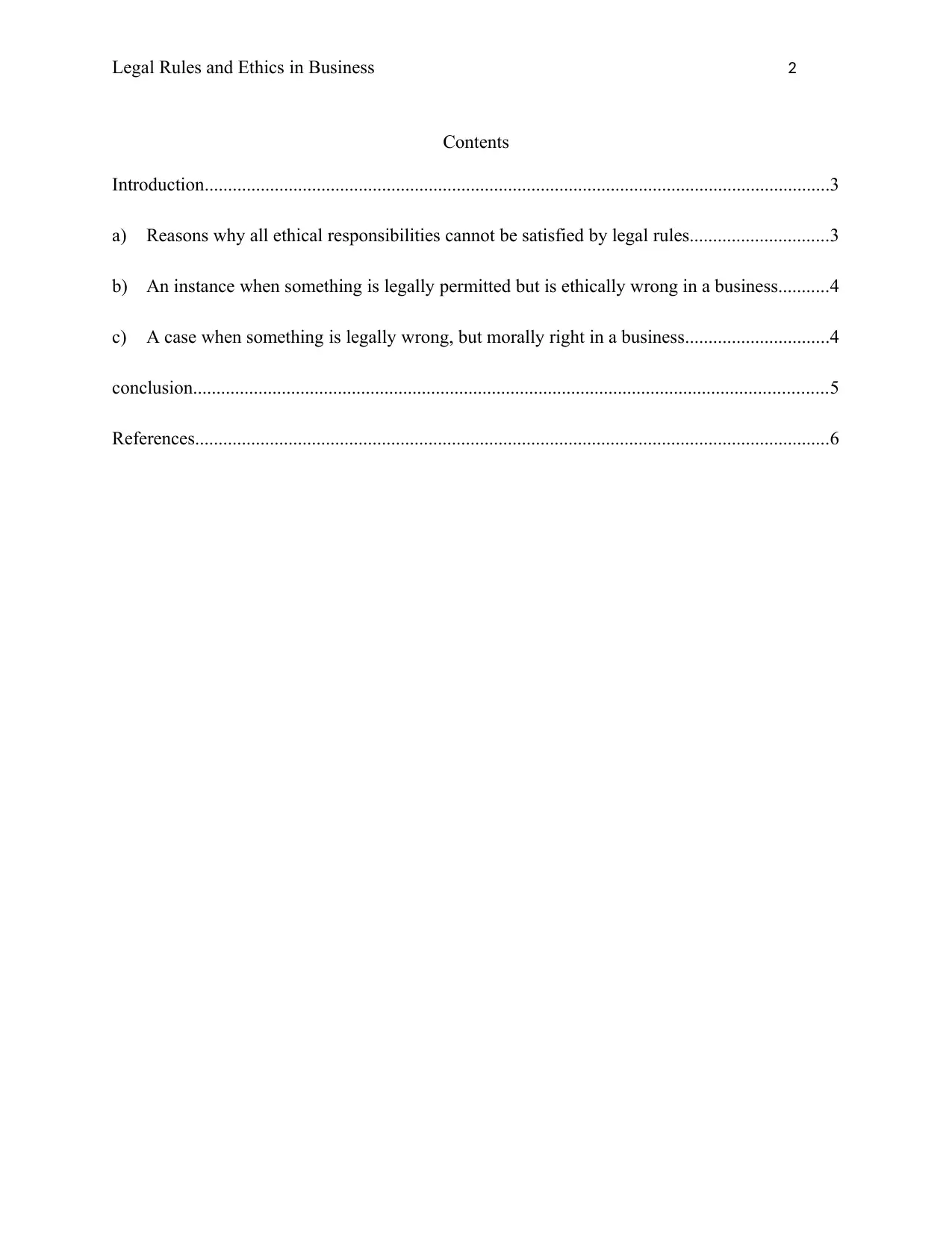
Legal Rules and Ethics in Business 2
Contents
Introduction......................................................................................................................................3
a) Reasons why all ethical responsibilities cannot be satisfied by legal rules..............................3
b) An instance when something is legally permitted but is ethically wrong in a business...........4
c) A case when something is legally wrong, but morally right in a business...............................4
conclusion........................................................................................................................................5
References........................................................................................................................................6
Contents
Introduction......................................................................................................................................3
a) Reasons why all ethical responsibilities cannot be satisfied by legal rules..............................3
b) An instance when something is legally permitted but is ethically wrong in a business...........4
c) A case when something is legally wrong, but morally right in a business...............................4
conclusion........................................................................................................................................5
References........................................................................................................................................6
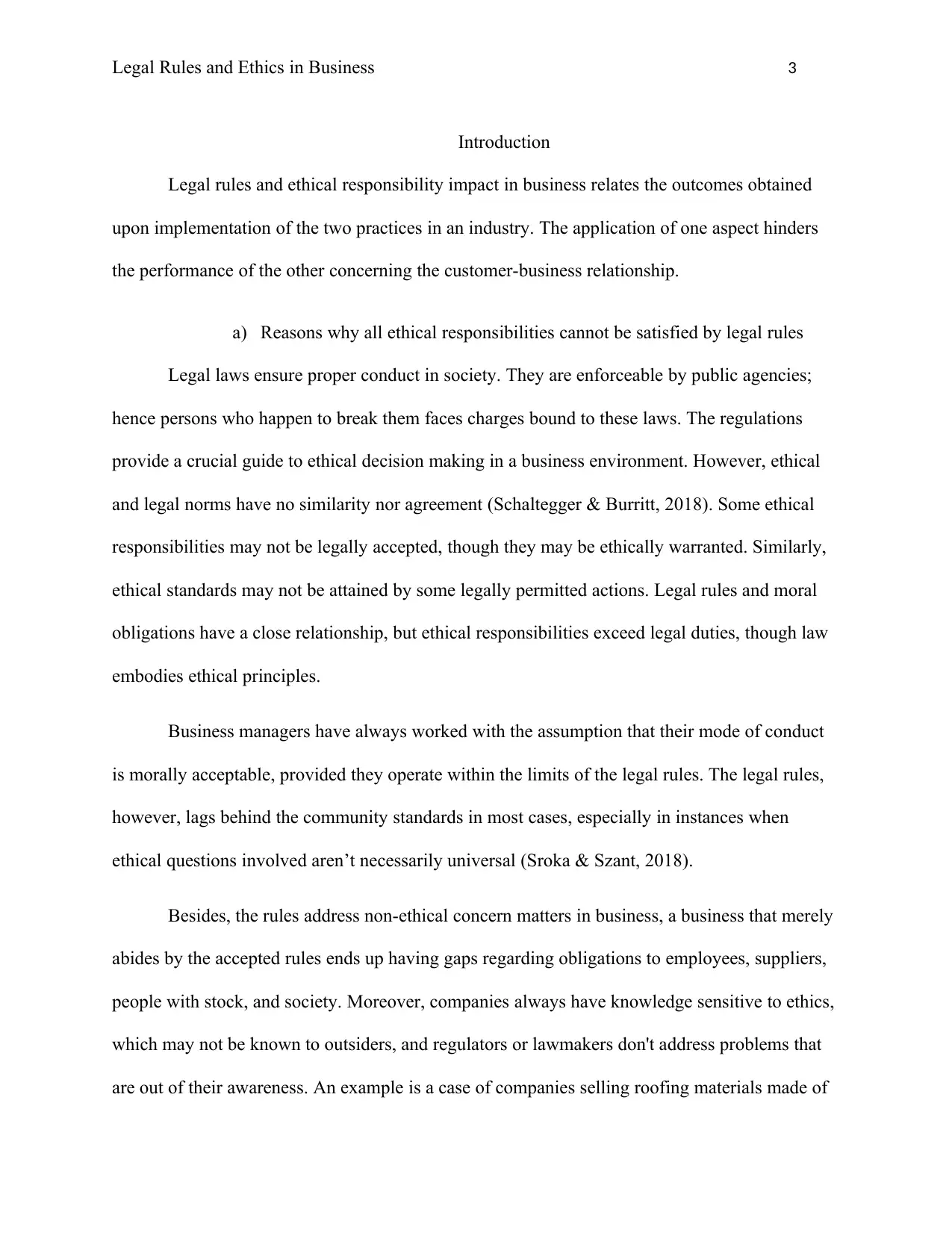
Legal Rules and Ethics in Business 3
Introduction
Legal rules and ethical responsibility impact in business relates the outcomes obtained
upon implementation of the two practices in an industry. The application of one aspect hinders
the performance of the other concerning the customer-business relationship.
a) Reasons why all ethical responsibilities cannot be satisfied by legal rules
Legal laws ensure proper conduct in society. They are enforceable by public agencies;
hence persons who happen to break them faces charges bound to these laws. The regulations
provide a crucial guide to ethical decision making in a business environment. However, ethical
and legal norms have no similarity nor agreement (Schaltegger & Burritt, 2018). Some ethical
responsibilities may not be legally accepted, though they may be ethically warranted. Similarly,
ethical standards may not be attained by some legally permitted actions. Legal rules and moral
obligations have a close relationship, but ethical responsibilities exceed legal duties, though law
embodies ethical principles.
Business managers have always worked with the assumption that their mode of conduct
is morally acceptable, provided they operate within the limits of the legal rules. The legal rules,
however, lags behind the community standards in most cases, especially in instances when
ethical questions involved aren’t necessarily universal (Sroka & Szant, 2018).
Besides, the rules address non-ethical concern matters in business, a business that merely
abides by the accepted rules ends up having gaps regarding obligations to employees, suppliers,
people with stock, and society. Moreover, companies always have knowledge sensitive to ethics,
which may not be known to outsiders, and regulators or lawmakers don't address problems that
are out of their awareness. An example is a case of companies selling roofing materials made of
Introduction
Legal rules and ethical responsibility impact in business relates the outcomes obtained
upon implementation of the two practices in an industry. The application of one aspect hinders
the performance of the other concerning the customer-business relationship.
a) Reasons why all ethical responsibilities cannot be satisfied by legal rules
Legal laws ensure proper conduct in society. They are enforceable by public agencies;
hence persons who happen to break them faces charges bound to these laws. The regulations
provide a crucial guide to ethical decision making in a business environment. However, ethical
and legal norms have no similarity nor agreement (Schaltegger & Burritt, 2018). Some ethical
responsibilities may not be legally accepted, though they may be ethically warranted. Similarly,
ethical standards may not be attained by some legally permitted actions. Legal rules and moral
obligations have a close relationship, but ethical responsibilities exceed legal duties, though law
embodies ethical principles.
Business managers have always worked with the assumption that their mode of conduct
is morally acceptable, provided they operate within the limits of the legal rules. The legal rules,
however, lags behind the community standards in most cases, especially in instances when
ethical questions involved aren’t necessarily universal (Sroka & Szant, 2018).
Besides, the rules address non-ethical concern matters in business, a business that merely
abides by the accepted rules ends up having gaps regarding obligations to employees, suppliers,
people with stock, and society. Moreover, companies always have knowledge sensitive to ethics,
which may not be known to outsiders, and regulators or lawmakers don't address problems that
are out of their awareness. An example is a case of companies selling roofing materials made of
⊘ This is a preview!⊘
Do you want full access?
Subscribe today to unlock all pages.

Trusted by 1+ million students worldwide
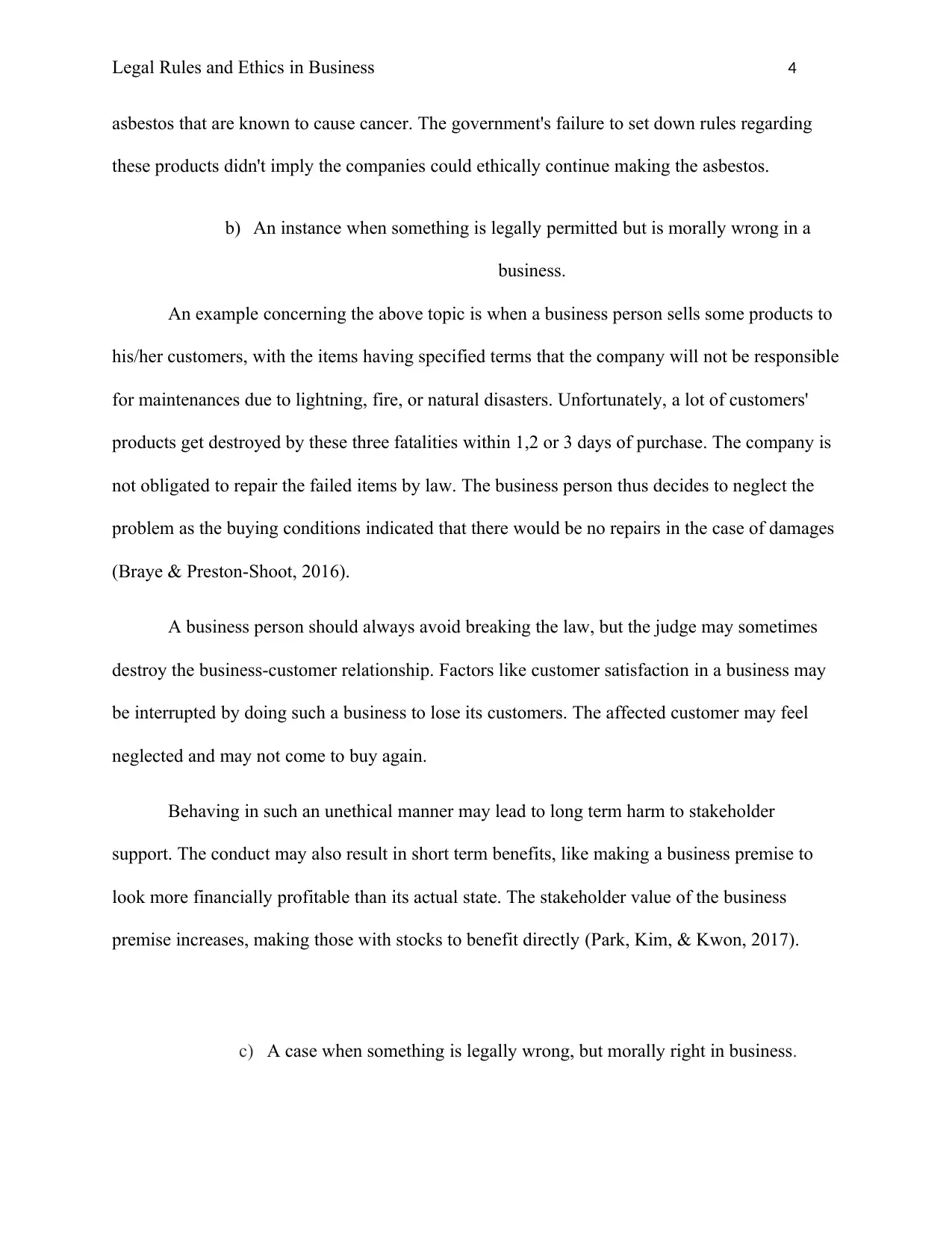
Legal Rules and Ethics in Business 4
asbestos that are known to cause cancer. The government's failure to set down rules regarding
these products didn't imply the companies could ethically continue making the asbestos.
b) An instance when something is legally permitted but is morally wrong in a
business.
An example concerning the above topic is when a business person sells some products to
his/her customers, with the items having specified terms that the company will not be responsible
for maintenances due to lightning, fire, or natural disasters. Unfortunately, a lot of customers'
products get destroyed by these three fatalities within 1,2 or 3 days of purchase. The company is
not obligated to repair the failed items by law. The business person thus decides to neglect the
problem as the buying conditions indicated that there would be no repairs in the case of damages
(Braye & Preston-Shoot, 2016).
A business person should always avoid breaking the law, but the judge may sometimes
destroy the business-customer relationship. Factors like customer satisfaction in a business may
be interrupted by doing such a business to lose its customers. The affected customer may feel
neglected and may not come to buy again.
Behaving in such an unethical manner may lead to long term harm to stakeholder
support. The conduct may also result in short term benefits, like making a business premise to
look more financially profitable than its actual state. The stakeholder value of the business
premise increases, making those with stocks to benefit directly (Park, Kim, & Kwon, 2017).
c) A case when something is legally wrong, but morally right in business.
asbestos that are known to cause cancer. The government's failure to set down rules regarding
these products didn't imply the companies could ethically continue making the asbestos.
b) An instance when something is legally permitted but is morally wrong in a
business.
An example concerning the above topic is when a business person sells some products to
his/her customers, with the items having specified terms that the company will not be responsible
for maintenances due to lightning, fire, or natural disasters. Unfortunately, a lot of customers'
products get destroyed by these three fatalities within 1,2 or 3 days of purchase. The company is
not obligated to repair the failed items by law. The business person thus decides to neglect the
problem as the buying conditions indicated that there would be no repairs in the case of damages
(Braye & Preston-Shoot, 2016).
A business person should always avoid breaking the law, but the judge may sometimes
destroy the business-customer relationship. Factors like customer satisfaction in a business may
be interrupted by doing such a business to lose its customers. The affected customer may feel
neglected and may not come to buy again.
Behaving in such an unethical manner may lead to long term harm to stakeholder
support. The conduct may also result in short term benefits, like making a business premise to
look more financially profitable than its actual state. The stakeholder value of the business
premise increases, making those with stocks to benefit directly (Park, Kim, & Kwon, 2017).
c) A case when something is legally wrong, but morally right in business.
Paraphrase This Document
Need a fresh take? Get an instant paraphrase of this document with our AI Paraphraser
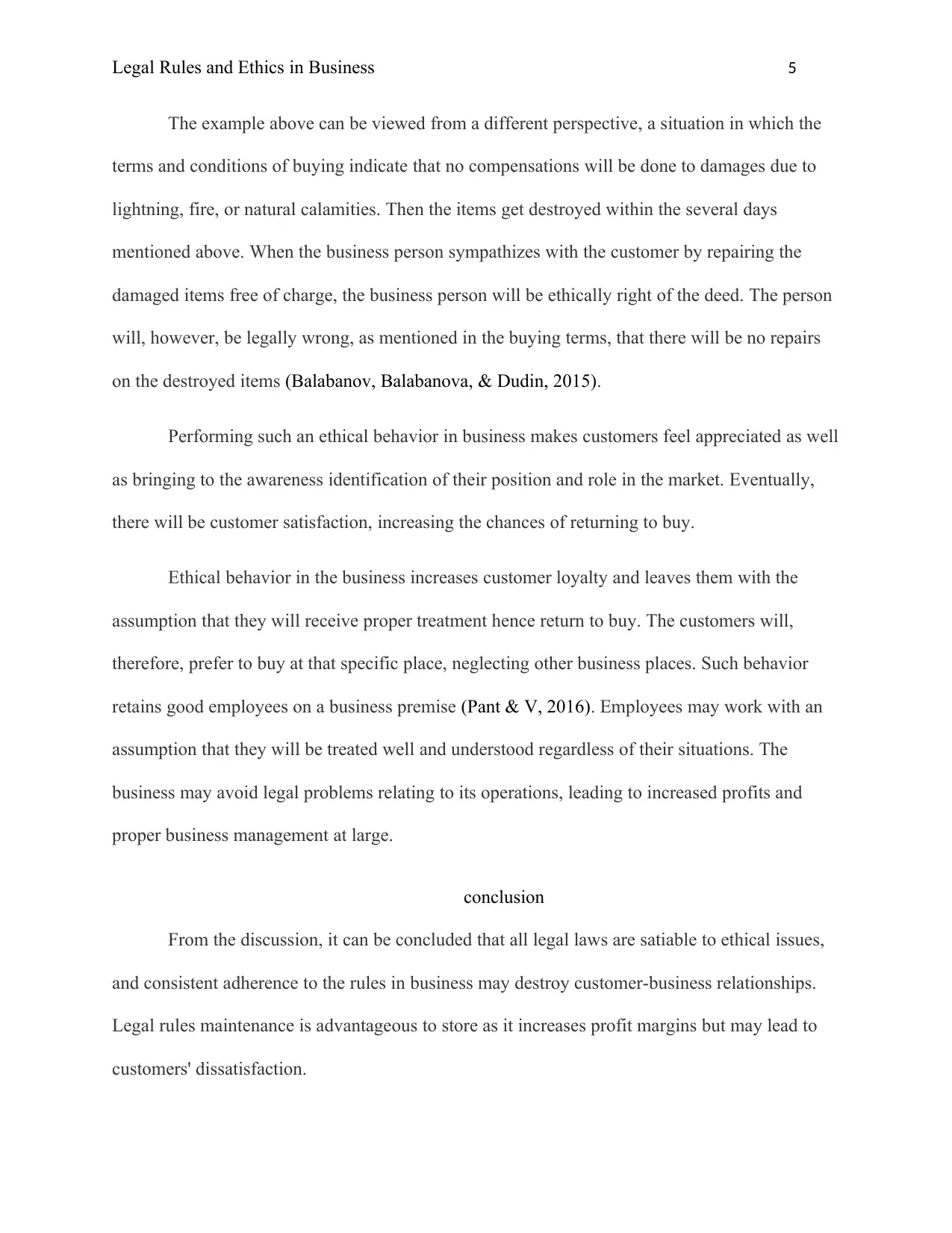
Legal Rules and Ethics in Business 5
The example above can be viewed from a different perspective, a situation in which the
terms and conditions of buying indicate that no compensations will be done to damages due to
lightning, fire, or natural calamities. Then the items get destroyed within the several days
mentioned above. When the business person sympathizes with the customer by repairing the
damaged items free of charge, the business person will be ethically right of the deed. The person
will, however, be legally wrong, as mentioned in the buying terms, that there will be no repairs
on the destroyed items (Balabanov, Balabanova, & Dudin, 2015).
Performing such an ethical behavior in business makes customers feel appreciated as well
as bringing to the awareness identification of their position and role in the market. Eventually,
there will be customer satisfaction, increasing the chances of returning to buy.
Ethical behavior in the business increases customer loyalty and leaves them with the
assumption that they will receive proper treatment hence return to buy. The customers will,
therefore, prefer to buy at that specific place, neglecting other business places. Such behavior
retains good employees on a business premise (Pant & V, 2016). Employees may work with an
assumption that they will be treated well and understood regardless of their situations. The
business may avoid legal problems relating to its operations, leading to increased profits and
proper business management at large.
conclusion
From the discussion, it can be concluded that all legal laws are satiable to ethical issues,
and consistent adherence to the rules in business may destroy customer-business relationships.
Legal rules maintenance is advantageous to store as it increases profit margins but may lead to
customers' dissatisfaction.
The example above can be viewed from a different perspective, a situation in which the
terms and conditions of buying indicate that no compensations will be done to damages due to
lightning, fire, or natural calamities. Then the items get destroyed within the several days
mentioned above. When the business person sympathizes with the customer by repairing the
damaged items free of charge, the business person will be ethically right of the deed. The person
will, however, be legally wrong, as mentioned in the buying terms, that there will be no repairs
on the destroyed items (Balabanov, Balabanova, & Dudin, 2015).
Performing such an ethical behavior in business makes customers feel appreciated as well
as bringing to the awareness identification of their position and role in the market. Eventually,
there will be customer satisfaction, increasing the chances of returning to buy.
Ethical behavior in the business increases customer loyalty and leaves them with the
assumption that they will receive proper treatment hence return to buy. The customers will,
therefore, prefer to buy at that specific place, neglecting other business places. Such behavior
retains good employees on a business premise (Pant & V, 2016). Employees may work with an
assumption that they will be treated well and understood regardless of their situations. The
business may avoid legal problems relating to its operations, leading to increased profits and
proper business management at large.
conclusion
From the discussion, it can be concluded that all legal laws are satiable to ethical issues,
and consistent adherence to the rules in business may destroy customer-business relationships.
Legal rules maintenance is advantageous to store as it increases profit margins but may lead to
customers' dissatisfaction.
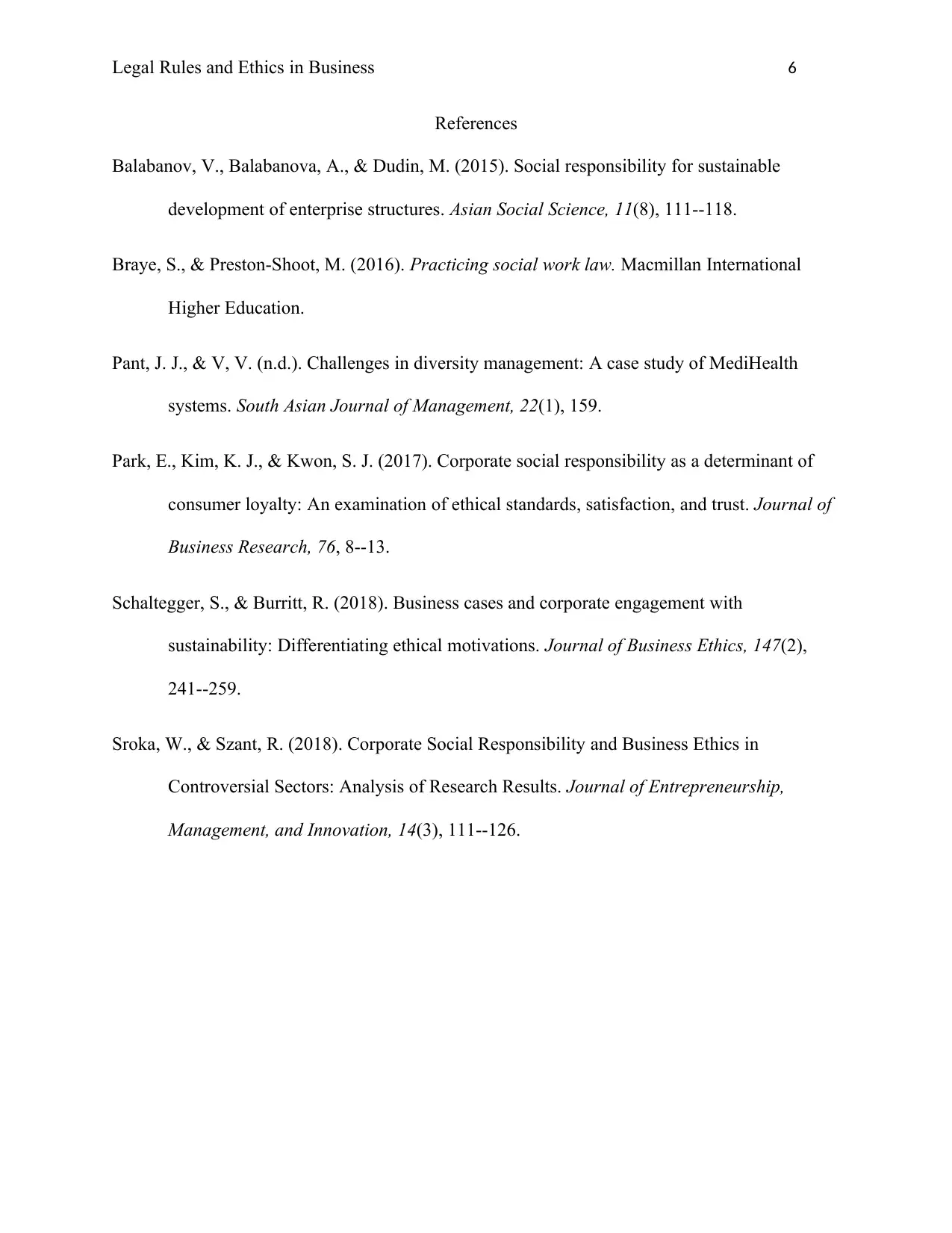
Legal Rules and Ethics in Business 6
References
Balabanov, V., Balabanova, A., & Dudin, M. (2015). Social responsibility for sustainable
development of enterprise structures. Asian Social Science, 11(8), 111--118.
Braye, S., & Preston-Shoot, M. (2016). Practicing social work law. Macmillan International
Higher Education.
Pant, J. J., & V, V. (n.d.). Challenges in diversity management: A case study of MediHealth
systems. South Asian Journal of Management, 22(1), 159.
Park, E., Kim, K. J., & Kwon, S. J. (2017). Corporate social responsibility as a determinant of
consumer loyalty: An examination of ethical standards, satisfaction, and trust. Journal of
Business Research, 76, 8--13.
Schaltegger, S., & Burritt, R. (2018). Business cases and corporate engagement with
sustainability: Differentiating ethical motivations. Journal of Business Ethics, 147(2),
241--259.
Sroka, W., & Szant, R. (2018). Corporate Social Responsibility and Business Ethics in
Controversial Sectors: Analysis of Research Results. Journal of Entrepreneurship,
Management, and Innovation, 14(3), 111--126.
References
Balabanov, V., Balabanova, A., & Dudin, M. (2015). Social responsibility for sustainable
development of enterprise structures. Asian Social Science, 11(8), 111--118.
Braye, S., & Preston-Shoot, M. (2016). Practicing social work law. Macmillan International
Higher Education.
Pant, J. J., & V, V. (n.d.). Challenges in diversity management: A case study of MediHealth
systems. South Asian Journal of Management, 22(1), 159.
Park, E., Kim, K. J., & Kwon, S. J. (2017). Corporate social responsibility as a determinant of
consumer loyalty: An examination of ethical standards, satisfaction, and trust. Journal of
Business Research, 76, 8--13.
Schaltegger, S., & Burritt, R. (2018). Business cases and corporate engagement with
sustainability: Differentiating ethical motivations. Journal of Business Ethics, 147(2),
241--259.
Sroka, W., & Szant, R. (2018). Corporate Social Responsibility and Business Ethics in
Controversial Sectors: Analysis of Research Results. Journal of Entrepreneurship,
Management, and Innovation, 14(3), 111--126.
⊘ This is a preview!⊘
Do you want full access?
Subscribe today to unlock all pages.

Trusted by 1+ million students worldwide
1 out of 6
Related Documents
Your All-in-One AI-Powered Toolkit for Academic Success.
+13062052269
info@desklib.com
Available 24*7 on WhatsApp / Email
![[object Object]](/_next/static/media/star-bottom.7253800d.svg)
Unlock your academic potential
Copyright © 2020–2026 A2Z Services. All Rights Reserved. Developed and managed by ZUCOL.





